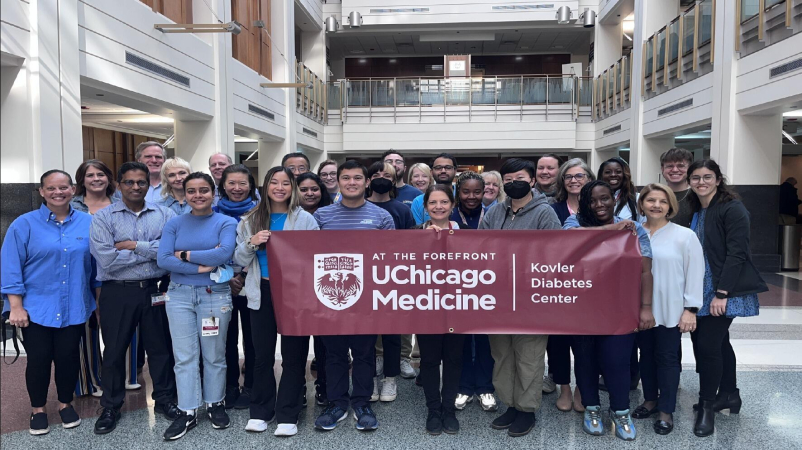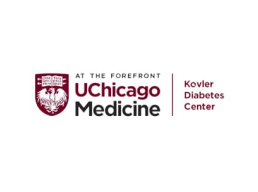
Led by Principal Investigator, Lou Philipson, MD, the TrialNet team at the University of Chicago is dedicated to preventing type 1 diabetes and stopping disease progression by preserving insulin production before and after diagnosis.
Note: As a TrialNet affiliate, University of Chicago is regionally overseen by Indiana University - Riley Hospital. If you reach out to TrialNet, you may be contacted by staff from either institution.
Our Team

Lou Philipson, MD, PhD
Louis Philipson, MD, PhD, is a renowned endocrinologist and a world authority on diabetes. Dr. Philipson’s clinical practice primary focus is on type 1 diabetes and rare forms of diabetes, and he has a multidisciplinary clinic to treat both adults and children. His approach to care centers around acknowledging the unique needs of each individual patient, taking into account their genetics and family history, as well as their specific diagnosis, in order to provide a customized treatment plan. Dr. Philipson is the founding director of the Kovler Diabetes Center. Together with his colleagues, Drs. Bell, Greeley and Naylor, they have created a center for monogenic diabetes and established the first United States registry for neonatal and monogenic diabetes to follow and treat patients with complex diabetes. For over 30 years, Dr. Philipson has been devoted to research that improves care for people with diabetes. His career first focused on cellular and translational studies related to insulin secretion, where he contributed to basic research in the control of insulin secretion via ion channels and calcium regulation in pancreatic beta cells. Currently, Dr. Philipson’s research is examining the genetic causes of diabetes and prevention of type 1 diabetes. He is also one of the principal investigators (PIs) and a member of the steering committee for the RADIANT study, a multicenter National Institute of Diabetes and Digestive and Kidney (NIDDK) Program working to identify atypical forms of diabetes (https://www.atypicaldiabetesnetwork.org/). As an accomplished author and co-author, Dr. Philipson has published over 180 peer-reviewed articles and co-edited “Atypical Diabetes,” a textbook printed by the American Diabetes Association. Dr. Philipson has been an active member of the American Diabetes Association (ADA) for his entire career including as the 2019 President for Science & Medicine, President of the Chicago/Northern Illinois ADA Community Board, a member of the ADA National Board, and on a variety of other committees. Presently, he is part of the steering committee for the ADA-EASD Precision Diabetes Medicine initiative. Finally, Dr. Philipson is the recipient of numerous awards and accolades, most notably the Banting medal for service as part of the 79th Annual Scientific Sessions (2019) for his term as President for Medicine and Science, and in 2018, he was inducted as a Laureate of the Lincoln Academy of Illinois at the 54th Convocation, the highest civilian honor of the State of the Illinois.
Cathleen Mulcahy, APN, FNP-C
Study CoordinatorResearch Studies
If you have a relative with T1D, you may be eligible for risk screening that can detect the early stages of T1D years before symptoms appear. More
Depending on your risk screening results, you may be eligible for monitoring. We’ll monitor you for disease progression and let you know if you become eligible for a study. More
TrialNet tested the drug abatacept to see if it could delay or prevent stage 1 T1D (two or more diabetes-related autoantibodies, but normal blood sugar) from progressing to stage 2 (abnormal blood sugar) or to stage 3 (clinical diagnosis). In an earlier study in people newly diagnosed (stage 3), participants treated with abatacept had 59% better insulin production and a 9.6-month average delay in progression of insulin loss compared to those who received placebo. That difference extended out to 3 years. Details
We are testing the drug hydroxychloroquine (HCQ) to see if it can delay or prevent early stage T1D (stage 1) from progressing to abnormal glucose tolerance (stage 2) and ultimately prevent clinical diagnosis (stage 3). HCQ is already used to reduce symptoms and progression of other autoimmune diseases, such as rheumatoid arthritis and lupus. This is the first study to see if it can prevent or delay T1D. Details
If you are diagnosed with T1D while participating in one of our prevention studies, we’re still here for you. You can continue to receive personal monitoring while helping us learn more. More





